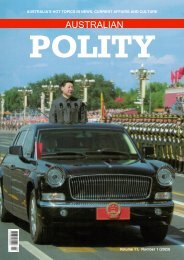Australian Polity, Volume 9 Number 3 - Digital Version
Australia's hot topics in news, current affairs and culture
Australia's hot topics in news, current affairs and culture
You also want an ePaper? Increase the reach of your titles
YUMPU automatically turns print PDFs into web optimized ePapers that Google loves.
citizens need to reach their full potential: that democratic
economy, a free people determined to shape our own
elections, the rule of law, freedom of thought and
expression, independent judiciaries and accountable
governments deserve our allegiance based on their
intrinsic merit and on their capacity to deliver better lives
for our people; that open business-led, market economies
provide the best means for generating shared prosperity
in a world of rapid change; and that, working together, our
countries can support, defend and (where necessary)
renovate a liberal, rules-based international order that
supports universal human rights and opportunities for
all - a world order that favours freedom over autocracy
and authoritarianism. We can’t be casual about these
values and beliefs. They are inextricably linked to our way
of life in this country. We can’t be passive about them.
We can’t expect others to advocate for us for them. We
live them, we must speak up for them.
As we battle the COVID-19 pandemic and look towards
recovery, I’ll be making the case for business-led growth
globally, just as we have done so here at home. Our relative
success is a broader proof point. Australia’s strong
economic recovery in the past year has demonstrated
the critical role governments play in a crisis, but also
the enduring importance of policy settings that put the
private sector at the centre of the economy: doing what
it does best – driving growth in our economy, innovating,
creating jobs, seeking out new opportunities.
Australia will be one of only two countries [in Cornwall],
together with the Republic of Korea, that can point to
an economy larger today than it was at the start of the
pandemic. This hasn’t occurred in Australia through more
regulation, more tax and more government directives to
the private sector. That has not been the Australian way
through this crisis. It has come about through greater tax
incentives. What we’re doing in our modern manufacturing
strategy is all about providing incentives, not greater
taxes. Regulatory reform, continued support for open
trade and a recognition that government overreach can
misdirect resources and impede the creation of good,
durable, high-wage jobs.
As always, we will be an advocate for a free and fair
rules-based system for international trade founded on
open markets. Australia’s prosperity rests squarely on
maintaining our position as an outward-looking, open
trading economy.
Reforming the WTO
At the G7, we will be working with others to buttress
the role of the World Trade Organization (WTO) and
to modernise its rulebook where necessary: a wellfunctioning
WTO that sets clear rules, arbitrates disputes
objectively and efficiently and penalises bad behaviour
when it occurs. This can be one of the most powerful
tools the international community has to counter
economic coercion.
In my discussions with many leaders, I have taken great
encouragement from the support shown for Australia’s
preparedness to withstand economic coercion in recent
times. The most practical way to address economic
coercion is the restoration of the global trading body’s
binding dispute settlement system. Where there are
no consequences for coercive behaviour, there is little
incentive for restraint.
The G7 meeting provides an opportunity to point a way
forward on Appellate Body reform by the WTO’s 12th
Ministerial Conference in November this year. This will
not be easy – Australia shares many of the concerns that
have been raised around the operation of the Appellate
Body. But restarting practical and serious-minded
negotiations is the essential first step in identifying
feasible and effective solutions that address the needs
of all economies.
Another area where enhanced multilateral cooperation
is essential is around data and the digital economy.
Coordinated action by liberal democracies is necessary to
ensure future global standards reflect the specific needs
and values of open societies. Australia has been a global
leader in advocating strengthened accountability and
transparency of online platforms (especially in support of
women’s safety and in combatting violent extremism and
terrorism and protecting our children from child abuse)
and we look forward to working collaboratively with other
liberal democracies on international standard setting.
Australian Polity 29





